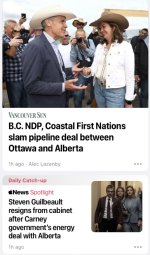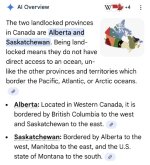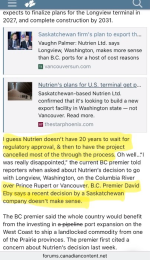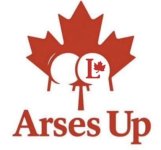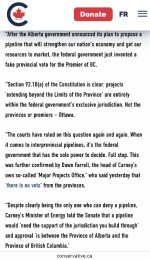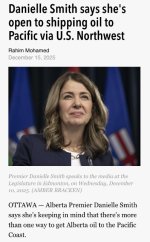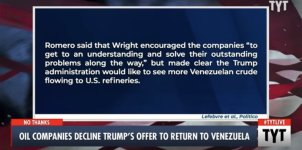B.C. Premier David Eby – who has vehemently opposed Alberta’s pursuit for a new bitumen pipeline to the West Coast (in the national best interest, etc…) – says he is open to a pipeline project in his province if the tanker ban remains in place?
(YouTube & 'I think David Eby doesn't know a whole lot about building pipelines' | Former BC Premier Christy Clark)
“If we can agree that the oil tanker ban is going to stay in place, then let’s have those conversations,” Eby later added.
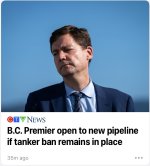
Hmmm…& then he wonders why this sort of thing happens?
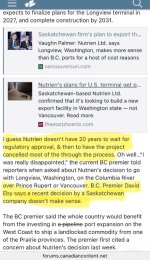
Prime Minister Mark Carney and Alberta Premier Danielle Smith signed a
historic energy co-operation agreement on Thursday, outlining the conditions that need to be met for a new oil pipeline to the Pacific to proceed.
In the memorandum of understanding (MOU), Alberta has agreed to negotiate an industrial carbon pricing agreement by April 2026 that would implement an industrial carbon price with a floor of $130 per tonne.
In return, the federal Liberals have agreed to suspend the clean electricity regulations in the province, not implement the oil and gas emissions cap, and
“if required,
” make an exemption to the federal tanker ban.
Carney also made it clear on Thursday that a new pipeline will only happen if a private sector proponent comes forward, and the tanker ban was enacted in 2019 and prohibits oil tankers carrying over 12,500 metric tons of crude or persistent oil from docking, loading or unloading at ports on the B.C. north coast to ensure a private sector proponent wouldn’t come forward.
According to the MOU, there is a commitment to construct “one or more private sector constructed and financed pipelines, with Indigenous Peoples co-ownership and economic benefits” with a “route that increases export access to Asian markets.” But there is no explicit obligation for a pipeline that would route through the B.C. north coast.
Eby also pointed to the B.C. government’s recent support to move more Alberta crude oil to the West Coast by increasing capacity to the Trans Mountain pipeline by 40 per cent, with results as early as 2026.
(The current Trans-Mountain pipeline is already running at more than 80% capacity, and within the next few years will be at 100% capacity, and that’s with Canada shipping 95% of its energy exports to America already at a steep discount. An increase of 40% of the 5% reaching a non-American destination would be 2% increase from the total)
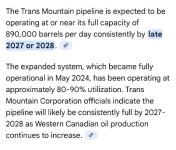
“We’ve offered
that up to Alberta to say we’re happy to work with you on this. And I say happy, but it’s gritted teeth,” Eby said?
“We fought that pipeline pretty hard for similar concerns, but it’s built now. It’s publicly owned. It is a moment for Canada. We’re willing to sit at the table and work out those details and get it done,” he added?
(YouTube & Vassy Kapelos Defends...Danielle Smith?! Triggers David Eby)
B.C. Premier David Eby – who has vehemently opposed Alberta’s pursuit for a new bitumen pipeline to the West Coast – says he is open to a pipeline project in his province if the tanker ban remains in place.

apple.news
But Mr. Eby said Friday the pipeline is never going to happen, citing the lack of a proponent and the
objections of Coastal First Nations…and that’s why he wasn’t at the table for discussions on the MOU.
Ok then, so David Eby is for a pipeline from Alberta (so in turn also from Saskatchewan) to…Washington State then (?) across the top of Montana and Idaho from these landlocked provinces (?) because “Elbows Up & Go Team Canada” in order to reach an ocean to expand beyond just discounting their products to only one customer for the most part, that flip-flops on financially attacking in Canada constantly for most of the last year?
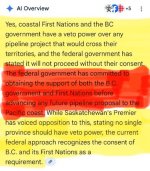
The federal government has effectively granted a veto to B.C. and First Nations, stating that it needs their agreement to advance a pipeline to the Pacific coast. This position is based on a commitment to work with all relevant stakeholders before
any project is approved…& here we are again/still.
(YouTube & Premier Moe CLAPS BACK At David Eby)


